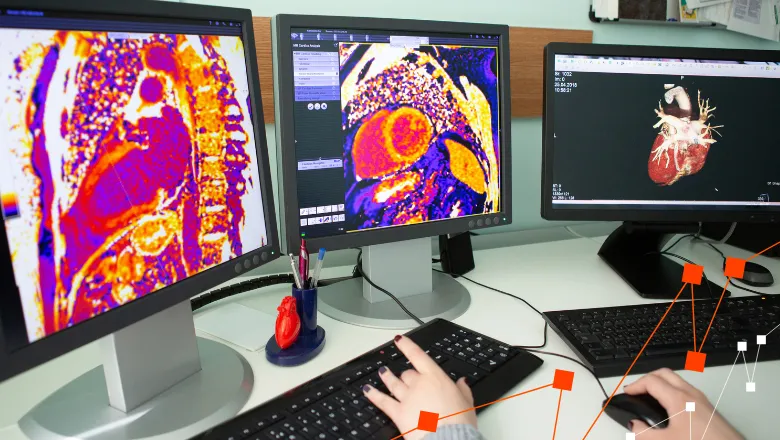This work proves that AI can be successfully deployed at a national scale within the NHS, and that making this advanced technology (FFRCT) available can improve patient treatment, reducing unnecessary invasive tests and repeat scans.
Dr Jonathan Weir-McCall, Clinical Senior Lecturer and Honorary Consultant in Cardiac Radiology
19 May 2025
King's researchers support nationwide study demonstrating safety and efficiency of AI in cardiovascular diagnosis
A major new study, co-led by researchers at the School of Biomedical Engineering & Imaging Sciences, has shown that an artificial intelligence (AI) diagnostic tool can be safely and effectively implemented at a national scale to improve the care of patients with suspected coronary artery disease (CAD).

Published in Nature Medicine, the study evaluated the real-world impact of introducing FFR-CT, an AI technology that analyses routine heart scans to assess whether narrowed arteries are likely to restrict blood flow. The tool was introduced across 27 NHS hospitals in England as part of a national innovation and technology programme.
The analysis included over 90,000 patients and found that using FFR-CT:
-
Reduced unnecessary invasive procedures by 7% overall, and by 16% for procedures that did not result in treatment;
-
Reduced non-invasive cardiac testing by 12%, streamlining the diagnostic pathway;
-
Was safe, with no increase in mortality or heart attack risk compared to standard care.
Researchers from the School and Guy’s and St Thomas’ NHS Foundation Trust contributed to the design and analysis of this nationwide implementation study, working in partnership with Liverpool Heart and Chest Hospital and other NHS trusts.
The AI tool, developed by HeartFlow, uses standard coronary CT angiography (CCTA) images to generate a personalised model of blood flow in the heart’s arteries. It provides clinicians with a functional assessment of whether a blockage is likely to be causing symptoms, helping guide decisions on further testing or treatment.
The NHS Innovation and Technology Payment programme centrally funded the rollout of FFR-CT, aiming to improve efficiency and reduce unnecessary procedures in patients presenting with chest pain.
The study’s findings reinforce national policy decisions and suggest that wider use of AI diagnostic aids could support more targeted, patient-specific care, all while making better use of NHS resources.

